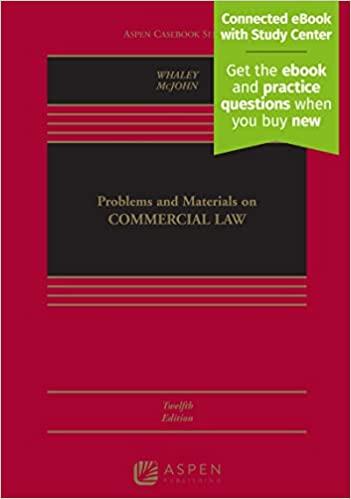Question
chapter 12 Critical Legal Thinking Case 12.1 Nonconforming Goods The Jacob Hartz Seed Company, Inc. (Hartz), bought soybeans for use as seed from E. R.
chapter 12
Critical Legal Thinking Case
12.1 Nonconforming Goods The Jacob Hartz Seed Company, Inc. (Hartz), bought soybeans for use as seed from E. R. Coleman. Coleman certified that the seed had an 80 percent germination rate. Hartz paid for the beans and picked them up from a warehouse in Card, Arkansas. After the seed was transported to Georgia, a sample was submitted for testing to the Georgia Department of Agriculture. When the department reported a germination level of only 67 percent, Coleman requested that the seed be retested. The second set of tests reported a germination rate of 65 percent. Hartz canceled the contract after the second test, and Coleman reclaimed the seed. Hartz sought a refund of the money it had paid for the seed, claiming the soybeans were nonconforming goods. Who wins? Jacob Hartz Seed Co. v. Coleman, 612 S.W.2d 91 (Ark. 1981).
Schlageter III, John J.; Cheeseman, Henry R.; Reed, Kathleen. Contract Law for Paralegals (p. 330). Pearson Education. Kindle Edition.
Critical Legal Thinking Case
12.3 Revocation of Acceptance Roy E. Farrar Produce Company (Farrar) was a packer and shipper of tomatoes in Rio Arriba County, New Mexico. Farrar contacted Wilson, an agent and salesman for International Paper Company (International), and ordered 21,500 tomato boxes for $.64 per box. The boxes were to each hold between 20 and 30 pounds of tomatoes for shipping. When the boxes arrived at Farrar's plant, 3,624 of them were immediately used to pack tomatoes. When the boxes were stacked, they began to collapse and crush the tomatoes contained within them. The produce company was forced to repackage the tomatoes and store the unused tomato boxes. Farrar contacted International and informed it that it no longer wanted the boxes because they could not perform as promised. International claimed that Farrar had accepted the packages and must pay for them. Who wins? International Paper Co. v. Farrar, 700 P.2d 642 (N.M. 1985).
Schlageter III, John J.; Cheeseman, Henry R.; Reed, Kathleen. Contract Law for Paralegals (p. 330). Pearson Education. Kindle Edition.
Step by Step Solution
There are 3 Steps involved in it
Step: 1

Get Instant Access to Expert-Tailored Solutions
See step-by-step solutions with expert insights and AI powered tools for academic success
Step: 2

Step: 3

Ace Your Homework with AI
Get the answers you need in no time with our AI-driven, step-by-step assistance
Get Started


